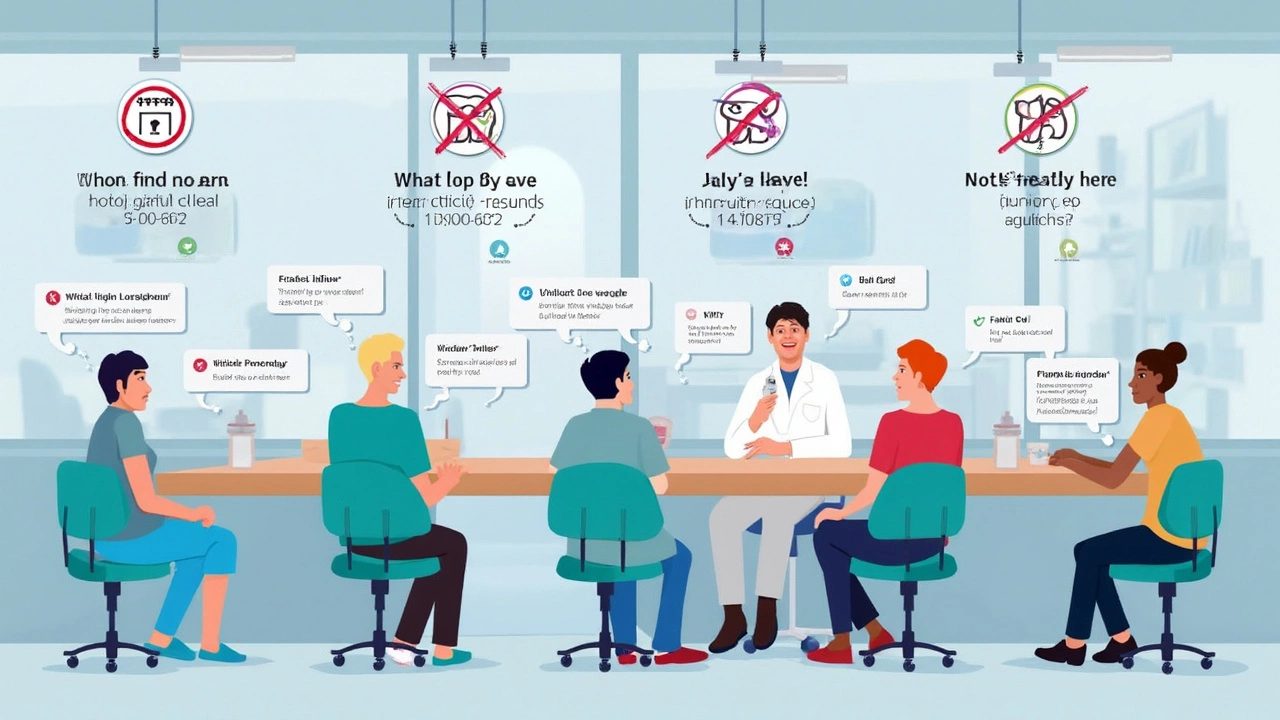Hitting 50 can feel like the start of a new chapter—sometimes in your mouth too. Tooth loss happens, whether it’s sudden or sneaks up over time, and lots of us wonder, “Isn’t it too late for dental implants?” Good news: age itself barely matters. I’ve seen folks in their 70s and even 80s get implants with gorgeous results, while some thirty-somethings struggle because of health issues.
Here’s the real deal—dentists mostly care about the condition of your gums, jawbone, and medical history, not your birthday. If you can brush your teeth, see your dentist regularly, and manage your existing health issues, chances are you’re a decent candidate. Bone loss is common as we age, but there are smart workarounds that UK clinics use, like bone grafts or mini implants.
- The Age Myth: Where Did It Come From?
- What Dentists Really Look For
- Health, Not Birthdays: Vital Factors
- Stories of Success After 50
- Tips for a Smooth Implant Experience
The Age Myth: Where Did It Come From?
It’s wild how often you hear, “Aren’t dental implants just for younger people?” That belief has roots in old-school thinking from back when implants first hit the scene in the ’60s and ’70s. Back then, dentists picked younger patients mainly because technology wasn’t as advanced, and there was this idea that older people simply wouldn’t heal as well.
Fast-forward to now, and things have changed a lot. Today’s implants are made with strong, super-safe titanium, and recovery times have seriously improved. Studies out of the UK and Europe show that people over 50 have implant success rates nearly identical to those in their 30s or 40s. That’s a major shift from what folks used to think.
Check out this quick comparison on implant success rates:
| Age Group | Success Rate (%) |
|---|---|
| 30-49 | 96 |
| 50-69 | 95 |
| 70+ | 94 |
As you can see, the numbers barely change. It’s more about your health than your age.
Busting the myth matters because it keeps people from putting off a fix that could change their lives. In the UK, more dentists are now educating patients over 50 about their options. The dental implants market has even seen a boost in this age group over the last decade, thanks to better public health info and easier access to NHS or private care.
If you’ve been told you’re “too old,” it’s probably time for a second opinion. The age barrier just isn’t what it used to be.
What Dentists Really Look For
If you’re thinking about getting dental implants after 50, the main thing dentists want to see is that your mouth can handle the change—not how many candles were on your last birthday cake. They use a checklist that’s surprisingly straightforward. Here’s what’s on their radar:
- Bone Health: Implants need something solid to sit in. Dentists will check your jawbone to make sure it’s thick and dense enough. If it’s not, there are ways to build it up, like bone grafts, but this step does add time to the whole process.
- Gum Health: Healthy gums are a must. If you have gum disease, it needs sorting first. Infections can make implants fail, so clinics are strict about this.
- General Health: Diabetes, heart conditions, and certain medicines (especially blood thinners and steroids) can affect healing. Dentists need to know what’s up with your general health to make a safe plan.
- Oral Hygiene: Being able to keep your mouth clean is a basic requirement. If you struggle with brushing or flossing, implants are risky since bacteria love to mess things up.
- Habits: Smoking is a red flag. It really does mess with healing and can double the risk of implants failing. Dentists will always encourage quitting or at least cutting down.
Some numbers make it clear how consistent these rules are. Across the UK, success rates for dental implants stay about 96-98% for healthy patients—no big drop-off past age 50. Check out this quick table for average implant outcomes by age group:
| Age Group | Implant Success Rate |
|---|---|
| 30-49 | 97.5% |
| 50-69 | 97.2% |
| 70+ | 96.8% |
The differences are basically tiny. At your appointment, expect your dentist to order x-rays or a 3D scan to scope out your bone, poke around your gums, and ask a LOT of questions about your medical history and any medicines you take.
If you have concerns—bring them up. Dentists have seen it all, and honestly, they’d rather answer your “embarrassing” or “stupid” questions up front to make sure you get the best results possible.

Health, Not Birthdays: Vital Factors
Forget the number on your last birthday card—what really matters for dental implants is your general health. Dentists dig into your medical history and habits, not your birth date. If you can keep up with daily brushing, don’t smoke much (or at all), and manage medical conditions like diabetes, you’re already ticking the main boxes for getting dental implants.
Here’s what clinics across the UK look for before saying yes to implants:
- Healthy gums: Gum disease can mess with healing, so it has to be under control. Swollen, bleeding gums? That gets sorted before any surgery.
- Sufficient jawbone: You need enough bone to support an implant. If you’ve lost some over the years, dentists can often fix this with grafts, which is pretty routine these days.
- Stable chronic conditions: Issues like high blood pressure or diabetes aren’t dealbreakers if they’re managed well. Out-of-control conditions or certain meds might complicate things, though, so your dentist will always check first.
- Non-smoking or willing to quit: Smokers heal slower and face higher risks. Many clinics insist that you cut down or quit before getting implants.
- Good oral hygiene: Dentists want to see you looking after your teeth, because daily care lowers your risk of infection and other problems during healing.
For a sense of how much health trumps age, check out the numbers below from a recent NHS data report in 2024:
| Age Group | Implant Success Rate |
|---|---|
| 40–49 | 97% |
| 50–59 | 96% |
| 60–69 | 95% |
| 70+ | 93% |
So, even after 50, implant success rates are sky-high. If you’re healthy, your chances of a smooth implant experience are nearly as good as someone half your age. Focus on your health habits and ask your dentist to walk you through a full medical check—don’t sweat the number on your cake.
Stories of Success After 50
If you’re worried that age might put you out of the running for dental implants, real-life stories say otherwise. Plenty of people in the UK are getting implants after 50—and loving the results. In fact, the British Dental Association has recorded a steady rise in implant procedures for patients aged 50 to 75 over the past decade. One NHS report notes that more than a quarter of implant patients are over 60.
Let’s look at a couple of UK examples. Take Sandra, 62, from Manchester. She had dentures for years but hated how they slipped at the wrong moments. Last year, she got two implants for her lower jaw. She says eating steak is simple again and she doesn’t need to worry about laughter or sneezing in public. Or John, 73, from Bristol—he thought his age and diabetes would rule him out, but after a full check-up and some prep work, his dentist gave him the green light. Now he brushes his implants like natural teeth and says he wishes he’d done it sooner.
Dental clinics report similar feedback all over the UK. The reason? Implants don’t have a strict age cutoff. As long as gums heal well and bone quality is managed—sometimes with grafting—patients in their 50s, 60s, and older can benefit. If you’re willing to follow dentist instructions on aftercare, your chances of a great outcome go way up.
One bit that stands out from these stories: nobody felt ‘too old’ afterwards. Instead, most felt more confident in social settings, could chew anything without stress, and liked that implants look just like natural teeth. That’s a big boost for anyone who wants a better quality of life—even if you’re years past 50.

Tips for a Smooth Implant Experience
So you’ve decided to get dental implants. Here’s how to make the whole process smoother, faster, and less stressful, especially if you’re over 50.
First, be upfront about your health. Dentists need to know about all medical conditions, even if you think it’s not linked to your mouth. Things like diabetes or osteoporosis don’t rule you out, but your dentist may adjust the treatment plan.
- Stop smoking before and after the procedure. Smoking slows down healing and bumps up the risk of implant failure. UK studies claim smokers are twice as likely to run into implant problems.
- Stick to your dental hygiene routine. Brush gently but thoroughly, and use an antibacterial mouthwash. Get a toothbrush with soft bristles; implants love gentle care.
- Don’t skip check-ups. Regular visits let your dentist spot early signs of infection or shifting. NHS data shows most implant failures can be prevented with early action.
- Eat soft foods right after surgery—think soups, eggs, and mashed spuds. Skip the chewy stuff until you’re cleared by your dentist, usually after a week or two.
- If you take medications like blood thinners or bisphosphonates, tell your dentist before surgery. Small changes in your meds can make a difference to your healing.
- Ask for a clear recovery plan. Good clinics will give you simple, written instructions, but always ask if you’re not sure about anything.
Here’s a quick table with average UK healing times:
| Stage | Usual Healing Time |
|---|---|
| Implant placement | 2-3 months (for bone to bond to implant) |
| Abutment placement | 1-2 weeks |
| Final crown fitting | About 1 week |
Keep in mind, everyone heals differently—age isn’t the thing to worry about. The main point is to follow advice and speak up if something feels off.
Finally, don’t rush back to your old routine. Giving yourself time to recover properly leads to much better results, especially for dental implants done after 50. Take it step by step, and you’ll be smiling with confidence before you know it.




